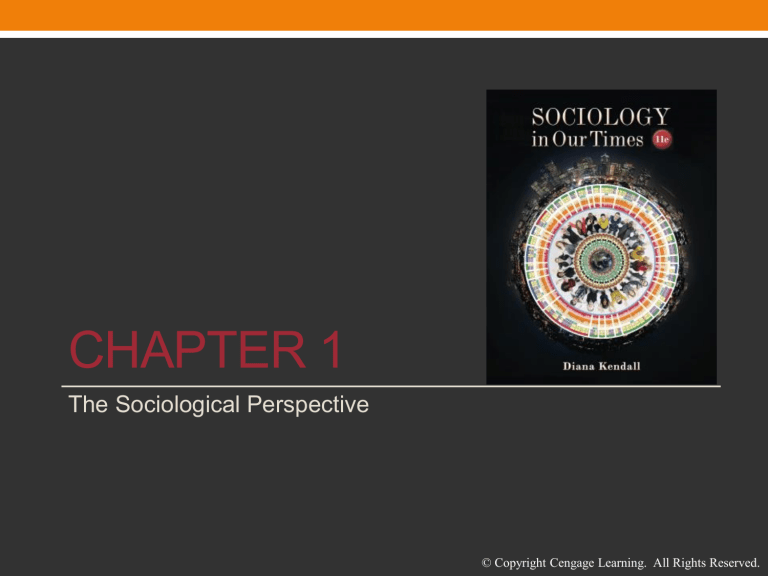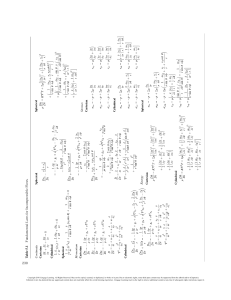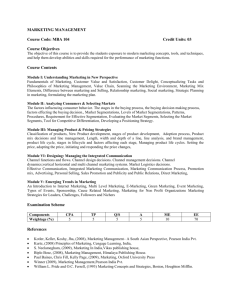
CHAPTER 1 The Sociological Perspective © Copyright Cengage Learning. All Rights Reserved. Chapter Outline • Putting Social Life into Perspective • The Importance of a Global Sociological • • • • Imagination The Development of Sociological Thinking The Development of Modern Sociology Contemporary Theoretical Perspectives Looking Ahead: Are Theory and/or Practice in Your Future? © Copyright Cengage Learning. All Rights Reserved. Putting Social Life Into Perspective • Sociology is the systematic study of human society and social interaction. • Sociologists study societies and social interactions to develop theories of: o how human behavior is shaped by group life o how group life is affected by individuals © Copyright Cengage Learning. All Rights Reserved. Consider This… Fields That Use Social Science Research In many careers, including jobs in health and human services, business, communication, academia, and law, the ability to analyze social science research is an important asset. Source: Based on Katzer, Cook, and Crouch, 1991. © Copyright Cengage Learning. All Rights Reserved. Putting Social Life Into Perspective (slide 1 of 2) • Society is a large social grouping that shares the same geographical territory and is subject to the same political authority and dominant cultural expectations. o Commonsense Knowledge versus Myth © Copyright Cengage Learning. All Rights Reserved. Putting Social Life Into Perspective (slide 2 of 2) • The sociological imagination is the ability to see the relationship between individual experiences and the larger society. o personal troubles: private problems that affect individuals and the networks of people with which they regularly associate o social/public issues: problems that affect large numbers of people and often require solutions at the societal level © Copyright Cengage Learning. All Rights Reserved. Discussion • In what ways has society shaped who you are today? • How can overspending be analyzed with the sociological imagination? © Copyright Cengage Learning. All Rights Reserved. The Importance of a Global Sociological Imagination • High-income countries: nations with highly industrialized economies (ex: United States, Canada, Japan, Western Europe) • Middle-income countries: nations with industrializing economies (ex: Eastern Europe, Brazil, Mexico) • Low-income countries: nations with little industrialization (ex: African and Asian countries) © Copyright Cengage Learning. All Rights Reserved. The World’s Economies in the 21st Century High-income, middleincome, and low-income countries. © Copyright Cengage Learning. All Rights Reserved. The Development of Sociological Thinking (slide 1 of 2) • Sociology and the Age of Enlightenment o emphasis on individual’s possession of critical reasoning and experience o science versus religion o the philosophes: if people were free from the ignorance and superstition of the past, they could create new forms of political and economic organization, such as democracy and capitalism © Copyright Cengage Learning. All Rights Reserved. The Development of Sociological Thinking (slide 2 of 2) • Sociology, Industrialization, and Urbanization o industrialization: the process by which societies are transformed from dependence on agriculture to manufacturing o urbanization: the process by which an increasing proportion of a population lives in cities rather than in rural areas © Copyright Cengage Learning. All Rights Reserved. Discussion • How have historical events influenced current society? © Copyright Cengage Learning. All Rights Reserved. Consider This… As the Industrial Revolution swept through the United States beginning in the nineteenth century, children being employed in factories became increasingly common. Soon social thinkers began to explore such new social problems brought about by industrialization. © Copyright Cengage Learning. All Rights Reserved. The Development of Modern Sociology • Early Thinkers: A Concern with Social Order and Stability o Comte o Martineau o Spencer o Durkheim • Differing Views on the Status Quo: Stability versus Change o Marx o Weber o Simmel o The Chicago School o Adams o Du Bois © Copyright Cengage Learning. All Rights Reserved. August Comte (1798-1857) • coined “sociology” • societies contain social statics and social dynamics • positivism: belief that the world can best be understood through scientific inquiry © Copyright Cengage Learning. All Rights Reserved. Harriet Martineau (1802-1876) • translated Comte’s works • Society in America • advocate of racial and gender equality © Copyright Cengage Learning. All Rights Reserved. Herbert Spencer (1920-1903) • evolutionary perspective • social Darwinism: belief that species of animals best adapted to their environment survive and prosper © Copyright Cengage Learning. All Rights Reserved. Emile Durkheim (1858-1917) • people are the product of their social environment • Rules of Sociological Method • social facts • anomie • suicide © Copyright Cengage Learning. All Rights Reserved. Karl Marx (1818-1883) • history is a continuous clash between conflicting ideas and forces • economic systems • class conflict – bourgeoisie versus proletariat © Copyright Cengage Learning. All Rights Reserved. Max Weber (1864-1920) • The Protestant Ethic and the Spirit of Capitalism • research should be value-free • rationalization © Copyright Cengage Learning. All Rights Reserved. Georg Simmel (1858-1918) • group size • formal sociology © Copyright Cengage Learning. All Rights Reserved. Jane Addams (1860-1935) • founded Hull House • Nobel Prize © Copyright Cengage Learning. All Rights Reserved. emporary sociologists because of her role as an early heorist of social change who influenced later feminist heorists and activists. Bois and Atlanta B. DuPhiladelphia W. E.• The desecond The y Universit Negro partment of sociology in the United States was founded by W. E. B. Du Bois (1868–1963) at Atlanta University. He created a laboratory of sociology, instiuted a program of systematic esearch, founded and conducted regular sociological conferences on research, founded wo journals, and established Library of Congress Prints and Photographs Division [LC-DIG-ggbain-07435] W.E.B. Du Bois (1968-1963) © Copyright Cengage Learning. All Rights Reserved. Contemporary Theoretical Perspectives (slide 1 of 3) • A theory is a set of logically interrelated statements that attempts to describe, explain, and predict social events. © Copyright Cengage Learning. All Rights Reserved. Contemporary Theoretical Perspectives (slide 2 of 3) • Functionalist Perspectives are based on the assumption that society is a stable, orderly system. o Society is composed of interrelated parts (institutions), each of which serve a function and contributes to the overall stability of the society. o Institutions include education, family, government, religion, the economy, among others © Copyright Cengage Learning. All Rights Reserved. Contemporary Theoretical Perspectives (slide 3 of 3) • Talcott Parsons – division of labor • Robert K. Merton – manifest and latent functions o Manifest functions are intended and/or overtly recognized. o Latent functions are unintended functions that are hidden and remain unacknowledged. o Dysfunctions are the undesirable functions of any element of a society. © Copyright Cengage Learning. All Rights Reserved. Consider This… Shopping malls are a reflection of a consumer society. A manifest function of a shopping mall is to sell goods and services to shoppers; however, a latent function may be to provide a communal area in which people can visit friends and enjoy an event. © Copyright Cengage Learning. All Rights Reserved. Contemporary Theoretical Perspectives (slide 1 of 3) • Conflict perspectives belief that groups in society are engaged in a continuous power struggle for control of scarce resources. o Karl Marx – bourgeoisie versus proletariat o Max Weber – power o C. Wright Mills – power elite © Copyright Cengage Learning. All Rights Reserved. Contemporary Theoretical Perspectives (slide 2 of 3) • The feminist approach stresses the importance of gender as an element of social structure. o Patriarchy is a system in which men dominate women. © Copyright Cengage Learning. All Rights Reserved. Contemporary Theoretical Perspectives (slide 3 of 3) • Symbolic interactionist perspectives argue that society is the sun of the interactions of individuals and groups. o Macro-level analysis: examines large-scale social structures o Micro-level analysis: focuses on small groups o interaction – communication between two people o symbols – something that meaningfully represents something else o subjective reality © Copyright Cengage Learning. All Rights Reserved. Consider This This multimillion-dollar penthouse is an example of conspicuous consumption. What examples of conspicuous consumption do you see in your community? © Copyright Cengage Learning. All Rights Reserved. Contemporary Theoretical Perspectives • Postmodern perspectives argue that existing theories have not successfully explained social life in postindustrial societies. © Copyright Cengage Learning. All Rights Reserved. Discussion • How can each theory be applied to understanding shopping and consumption? • Which theoretical perspective do you find more compelling? Why? © Copyright Cengage Learning. All Rights Reserved. Looking Ahead: Are Theory and/or Practice in Your Future? Practical sociological knowledge can be divided into five roles o Decision Makers o Educators o Commentators and Social Critics o Researchers o Consultants © Copyright Cengage Learning. All Rights Reserved. Consider This… These students are spending a day of service, helping to build a home. Many colleges and universities have similar service days to help their communities. What projects could you and your peers undertake? © Copyright Cengage Learning. All Rights Reserved. Discussion • How do you think you might be able to use sociology in your future career? • Which role do you think is most important for sociologists to occupy? © Copyright Cengage Learning. All Rights Reserved. QUICK QUIZ © Copyright Cengage Learning. All Rights Reserved. 1. Sociology is the systematic study of: a. b. c. d. intuition and commonsense knowledge human society and social interaction the production, distribution, and consumption of goods and services in a society personality and human development Answer: b Sociology is the systematic study of human society and social interaction. © Copyright Cengage Learning. All Rights Reserved. 2. _____ stressed history is a continuous clash between conflicting ideas and forces. a. b. c. d. e. Auguste Comte Harriet Martineau Herbert Spencer Emile Durkheim Karl Marx Answer: e Karl Marx stressed that history is a continuous clash between conflicting ideas and forces. © Copyright Cengage Learning. All Rights Reserved. 3. _____ perspectives are based on the assumption that society is a stable, orderly system. a. b. c. d. Functionalist Interactionist Conflict Feminist Answer: a Functionalist perspectives are based on the assumption that society is a stable, orderly system. © Copyright Cengage Learning. All Rights Reserved. 4. The idea that research should be conducted in a scientific manner and would exclude the researcher’s personal values and economic interests was emphasized by: a. b. c. d. Jane Addams Karl Marx Georg Simmel Max Weber Answer: d The idea that research should be conducted in a scientific manner and would exclude the researcher’s personal values and economic interests was emphasized by Max Weber. © Copyright Cengage Learning. All Rights Reserved. 5. The early social thinker who coined the term sociology and whose philosophy became known as positivism is: a. b. c. d. Karl Marx Emile Durkheim Auguste Comte Harriet Martineau Answer: c The early social thinker who coined the term sociology and whose philosophy became known as positivism is Auguste Comte. © Copyright Cengage Learning. All Rights Reserved.


